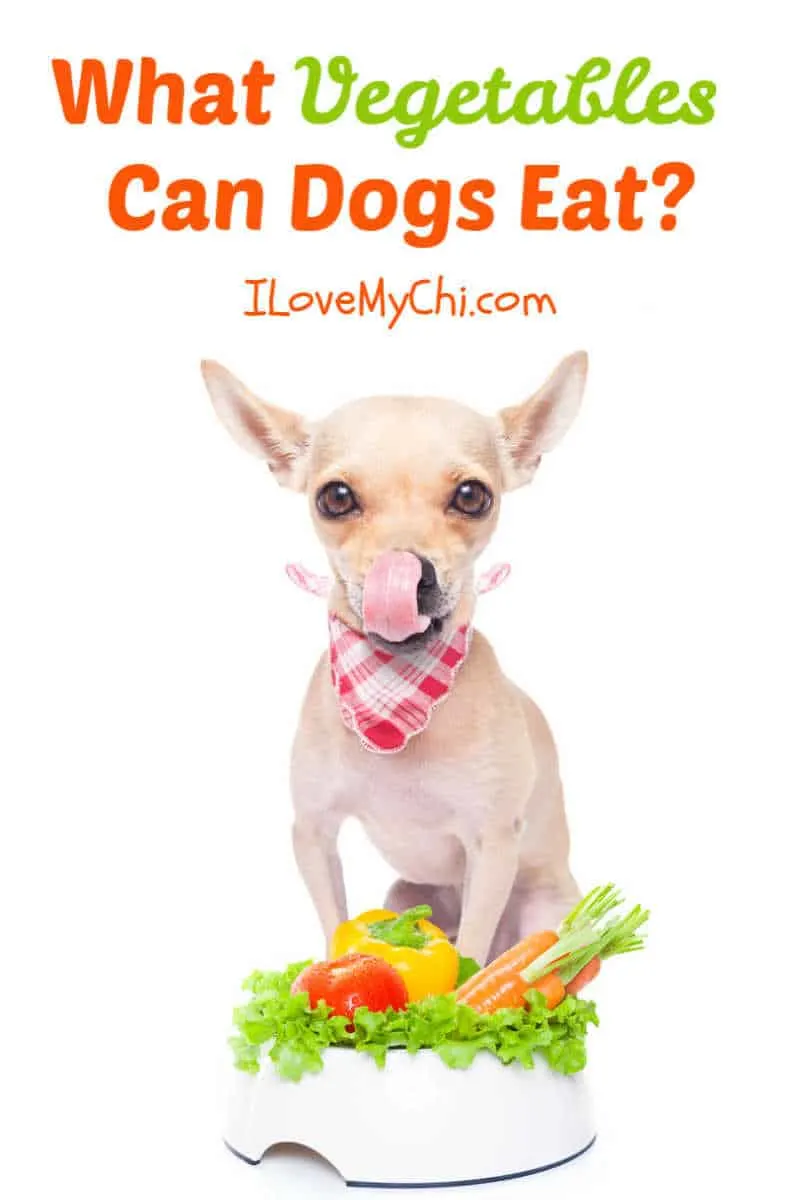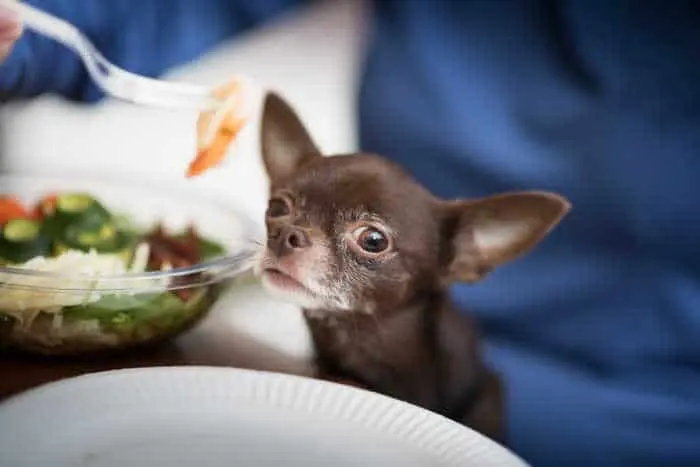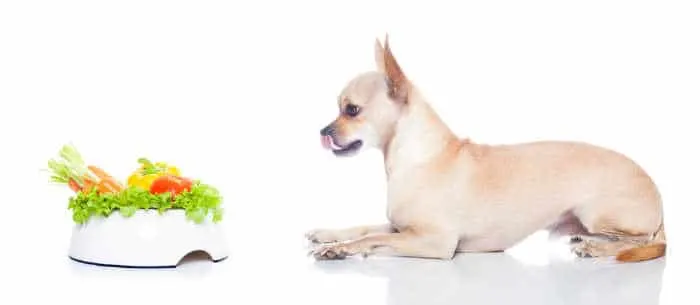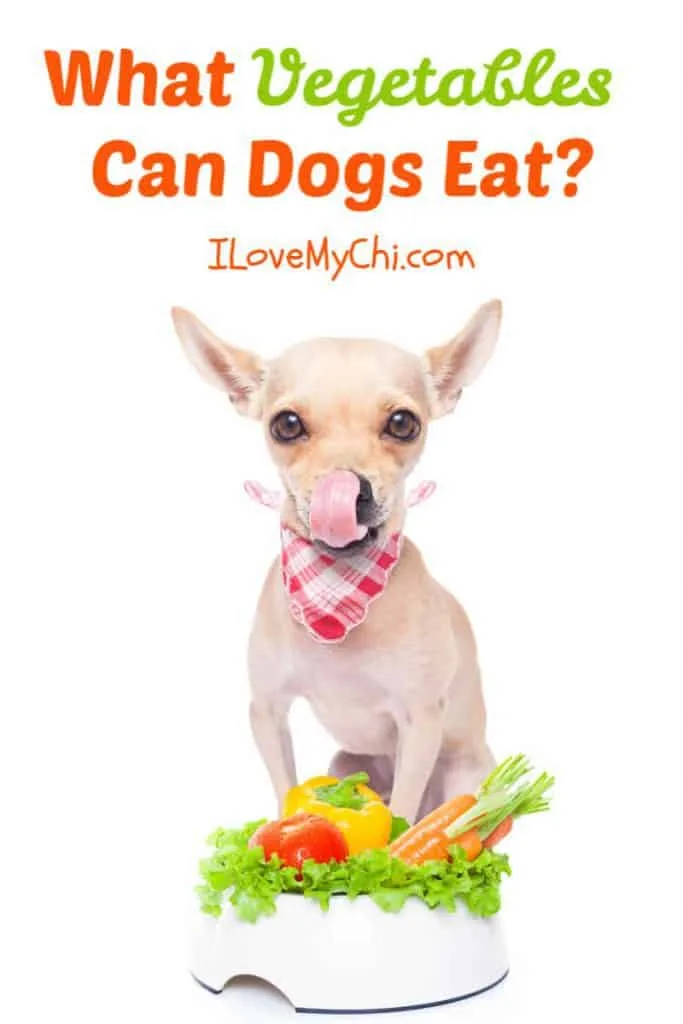
Are all veggies good for dogs or even safe for them to eat? Let’s discuss:
What Vegetables are NOT safe for dogs?
According to the American Kennel Club, the following vegetables are toxic to dogs:
- Onions and Garlic: There are no safe forms of these veggies for dogs to eat. They cause irreversible damage to their red blood cells.
- Rhubarb: This veggie is toxic and should never be fed.
- Mushrooms: No type of mushroom, wild or garden-grown, should be fed to dogs, as they are toxic. Many dogs are drawn to them because of their odor, making them a very real danger.
- Asparagus: The raw form of this veggie is hard for dogs to chew, posing a choking hazard. Cooking it to be soft enough for them to eat safely cooks nutrients out of it, defeating the purpose of feeding it.
What Vegetables Can Dogs Eat?

According to the American Kennel Club, there is a variety of vegetables that are not only safe but also beneficial for canine consumption:
- Broccoli: Broccoli is a good source of vitamin c and fiber. Florets may be fed as a snack, however, stalks should never be fed, as they may cause an obstruction.
- Brussel Sprouts: This unpopular veggie offers antioxidants for your canine companion.
- Carrots: These crunchy snacks can be fun to chew on and can help clean their pearly whites.
- Celery: Celery offers vitamins A-C, may freshen breath, is fun to chew on, and may contribute to heart health.
- Green Beans: Green beans are great for dogs; they offer minerals and vitamins. Green beans are also a source of fiber, which when fed daily, may help reduce build-up in anal glands.
- Peas: dogs may eat English peas, snow peas, green peas, and sugar snap peas. They offer vitamins, fiber, minerals, and protein.
- Spinach: dogs may eat spinach in moderation. Large quantities of spinach may cause kidney damage and issues with absorbing calcium.
- Cucumber: Cucumbers are a great summertime snack for dogs, as they are 96% water, making them a good source of hydration that is fun to chew on. However, dogs cannot eat pickles. The high water content of cucumbers can also cause your dog to have diarrhea, so make sure that you limit the amount your give to your dog.
- Zucchini: Many dogs enjoy chewing this mineral and vitamin-packed veggie.
Benefits of feeding Vegetables to Dogs
There are many reasons to feed vegetables to your dogs, such as:
- Clean eating: Many commercial dog foods and treats contain some not-so-nice preservatives and chemicals. To preserve vegetables, they may be preserved by being frozen without any chemicals or preservatives to stay edible.
- Healthy living: As discussed above, vegetables are a good source of vitamins, minerals, antioxidants, and other good stuff that may contribute to your dog living their best healthy life.
- Low-calorie snacks: Dogs who struggle to maintain a healthy weight may slim down by snacking on low-calorie vegetables instead of high-calorie commercial dog treats. Owners may replace a portion of their dog’s meals with green beans as a low-calorie source of fiber to help them feel full while helping them reach their healthy weight goal.
Purchasing vegetables for your dog

When purchasing vegetables for your dog to eat, you have several options:
- Fresh: When purchasing fresh veggies for your dog, be sure to carefully inspect them for mold and wash them thoroughly before feeding them. Some owners plant their own organic gardens to grow fresh vegetables for their dogs and their family. Dogs may enjoy “helping” their owners maintain their vegetable garden.
- Canned: Be sure to select low sodium, unseasoned, canned vegetables.
- Frozen: Since dogs cannot eat vegetables in the large quantities that we do, frozen vegetables are a good choice, as you can feed small serving sizes without the vegetables going bad.
As you shop for vegetables for your dog, you may find the ASPCA Poison Control app to be a helpful reference as you shop.
Compiled by the ASPCA’s veterinary staff, this free app helps owners identify what foods their dogs may or may not eat.

How to prepare vegetables for your dog to eat
When preparing vegetables for your dog to eat, keep the following in mind:
- Keep it simple: Feed plain vegetables; raw or cooked. Do not add seasoning, spices, and oils. Dogs cannot tolerate the seasonings that we can and they will suffer digestive upset as a result. Also, some seasonings may be toxic for dogs.
- Share the snacks: As you prepare vegetables for yourself or your family, set aside a small serving of plain vegetables for your dog to enjoy before you begin seasoning the vegetables. Children may be motivated to eat their vegetables if they see their dog eagerly digging into the same snack.
- Safety: The biggest danger associated with feeding dogs vegetables is the choking hazard. Be sure to cut vegetables into manageable bite-sized pieces and watch your dog to make sure she chews the vegetables. If a vegetable is given as a chew toy, supervise your dog as she chews and eats the vegetable. When it becomes small enough to become a choking hazard, take it away and cut the remaining pieces into manageable bite-sized pieces.
- Feed in moderation: Dogs should not eat large quantities of vegetables. While veggies do offer health benefits for dogs, large servings may upset their tummies.
- Frozen Veggies: Be sure to carefully comb through the vegetables as you are preparing them to ensure that another type of vegetable that is not safe for dogs did not sneak in during the packing process.
- Temperature: If you will be heating up vegetables for your dog to eat, consider the temperature of the vegetables before offering them to your dog. Dogs do not test their veggies to make sure it’s a comfortable temperature to eat in their excitement to have new snacks.
Dogs cannot enjoy all the foods that humans can. However, dogs can enjoy certain vegetables with their owners, and they may also reap similar health benefits.
I’d love to know what veggies you feed your dog. Leave a comment and let us know!
Vegetables should always be prepared without any seasonings and served in moderation.
ALSO READ:
Adding veggies and fruit to your dog’s food
Thanksgiving food safe for dogs
Dangerous holiday things for dogs


Dr. Sara Ochoa
DVM
This article has been fact-checked and approved by Dr. Sara Ochoa DVM. You can read more about her on our About page.


Ellie
Thursday 10th of March 2022
I have 2 chihuahuas and they are under 2yrs old. I cut canned greenbeans and canned carrots up in tiny pieces then mix with their dry science diet food or Fresh Pet rolled foo cut in tiny pieces. They eat it all.
Cathy
Friday 11th of March 2022
Green beans and carrots are great for dogs. I wish mine liked carrots.
Danielle
Sunday 27th of June 2021
Raw Carrots chopped in mini chopper is their fav Also string beans cooked lightly and chopped.Bell peppers are bad and for them also sweet patatoes
Cathy
Sunday 27th of June 2021
I have always heard that sweet potatoes were good for them. But I can see why bell peppers wouldn't be. It would make them gassy.
Dale Ann Thompson
Friday 14th of August 2020
I have 2 dachshunds. They both love carrots...raw, cooked or frozen. They like apples, bananas, green beans (cooked), blueberries, raw potatoes, almost anything I give them. They don't get all these foods all the time. Only as a treat once in awhile. Carrots and apples are their fav though.
Cathy
Friday 14th of August 2020
Does the raw potatoes give them the runs? I have heard that it does but don't have personal experience with them. I wish my dogs liked carrots. They make great teeth cleaners. But mine do like green beans and apples.
Carol Quandt
Saturday 19th of October 2019
What fruits are on the do not eat lists. My dog can smell cantaloupe a mile away.
Cathy
Saturday 19th of October 2019
Cantaloupe is great for dogs. We have a full list here: https://ilovemychi.com/chihuahuas-and-fruit/